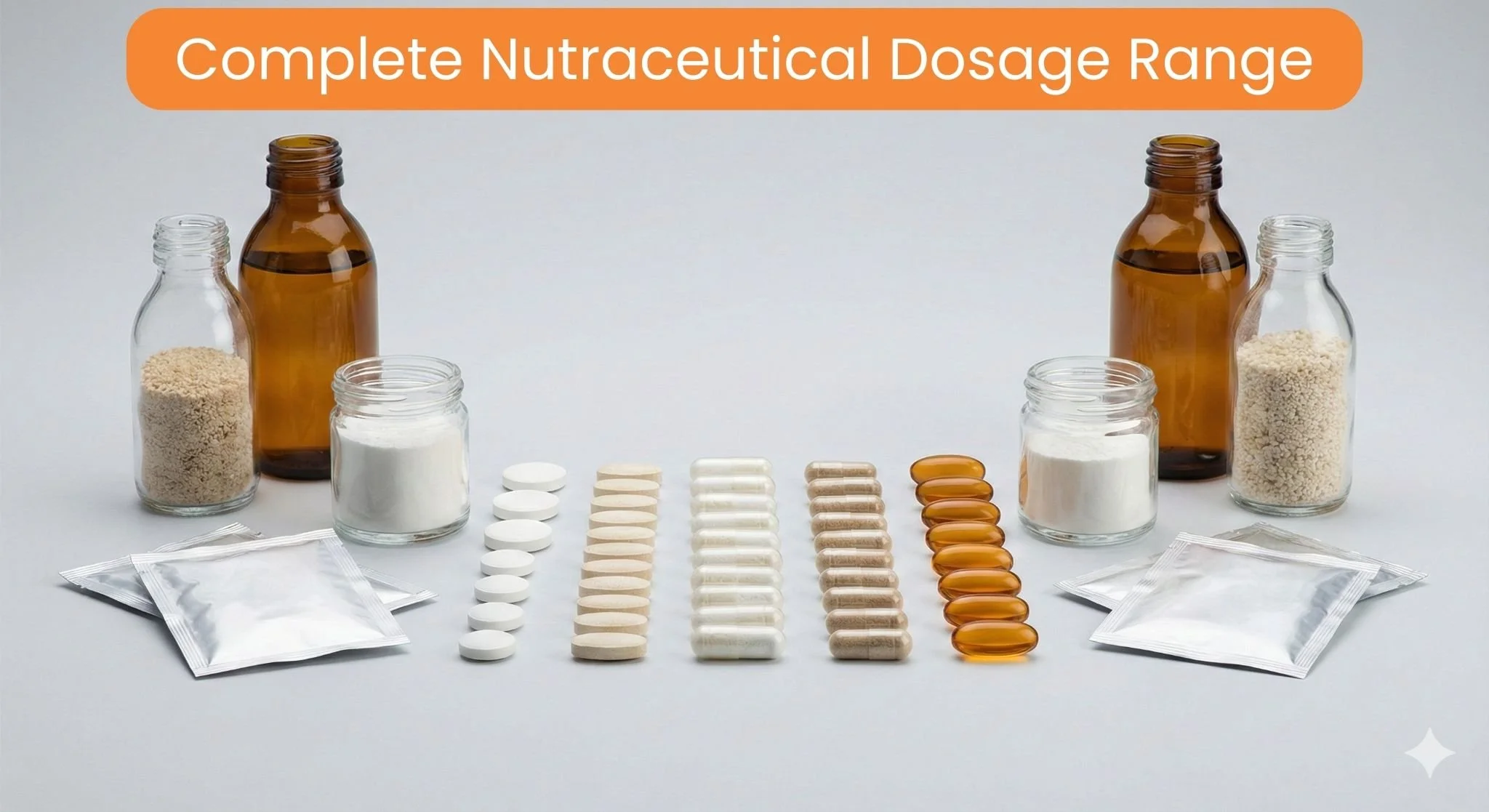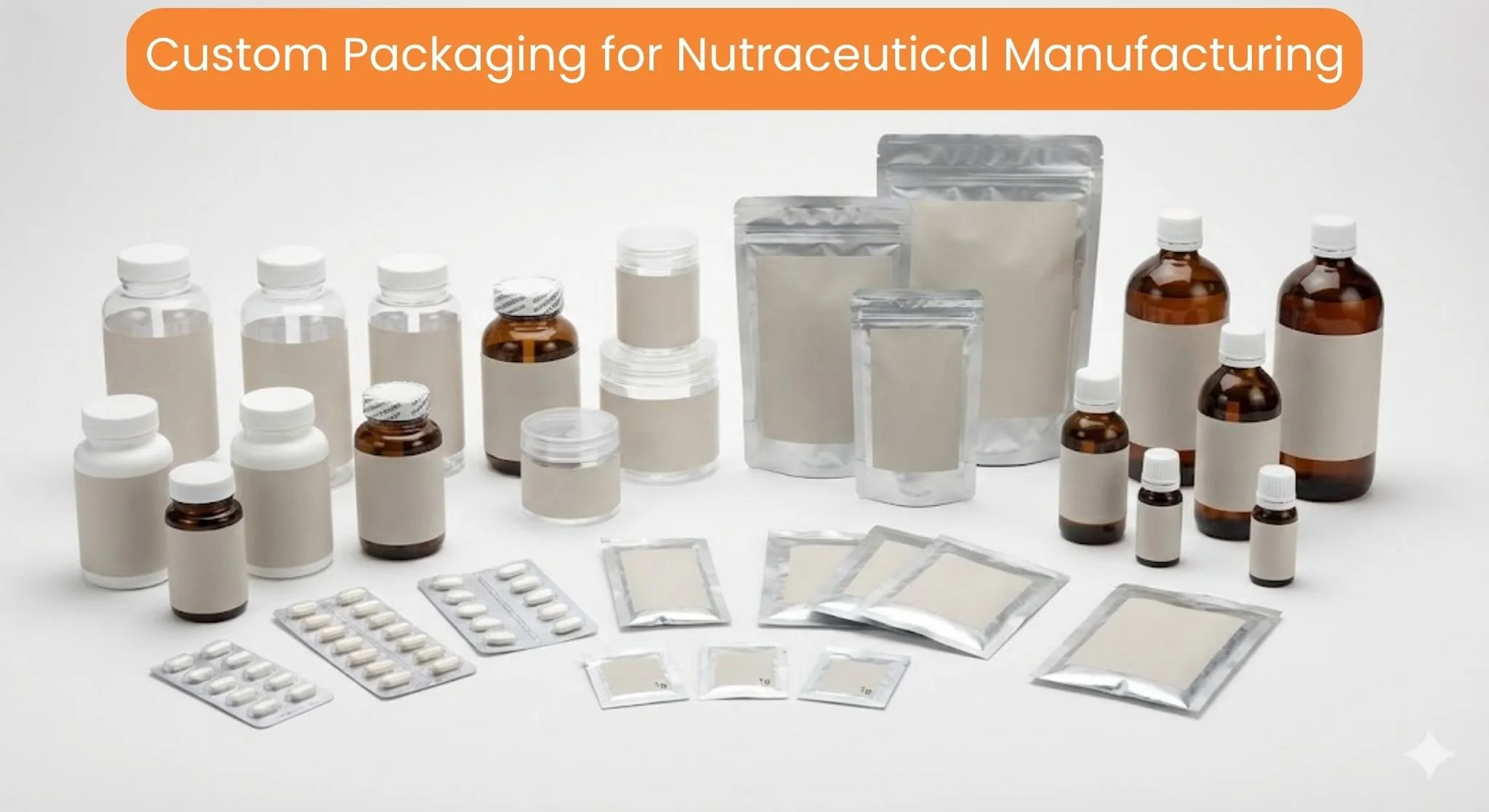Why Softgel Capsules Manufacturing is the Future of Nutraceuticals: Benefits for Brands and Consumers
The global nutraceutical market is experiencing an exponential rise, and as consumer demand for effective, convenient, and fast-absorbing supplements grows, softgel capsules are leading the charge. At Brukem Life Care, a trusted softgel capsules manufacturer in India, we are positioned to provide high-quality, cost-effective softgel manufacturing solutions for nutraceutical brands worldwide. Here’s why softgel capsules are the future of the industry and how Brukem Life Care is the ideal partner for your supplement production.
Superior Bioavailability of Softgel Capsules: Why Brands Should Make the Switch
Softgel capsules have become the preferred choice for many brands because of their superior bioavailability. The liquid or semi-solid fill inside softgels is absorbed much faster than traditional tablets, ensuring that active ingredients reach the bloodstream quickly. This feature makes softgels ideal for omega-3 fatty acids, herbal supplements, vitamin D3, coenzyme Q10, and other nutraceutical products that need to be absorbed efficiently. By offering faster action, softgels enhance the effectiveness of supplements, making them a preferred option for both consumers and manufacturers.
Brukem Life Care’s Extensive Range of Softgel Capsule Products
At Brukem Life Care, we manufacture a wide variety of softgel capsules to cater to diverse health needs and consumer preferences. Our product range includes:
Omega-3 Fatty Acid Softgel Capsules: Essential for heart, brain, and eye health.
Cod Liver Oil Softgel Capsules: A rich source of vitamins A & D.
Vitamin E Softgel Capsules: Known for antioxidant properties and supporting skin health.
Vitamin D3 Softgel Capsules: Vital for bone health and immune support.
Krill Oil Softgel Capsules: A premium source of omega-3 with anti-inflammatory benefits.
Coenzyme Q10 Softgel Capsules: A potent antioxidant supporting heart health and energy levels.
Multivitamin Softgel Capsules: Covering a wide spectrum of essential nutrients for daily health.
Evening Primrose Oil Softgel Capsules: Beneficial for hormonal balance and skin health.
Liver Detox Softgel Capsules: Ideal for detoxification and liver support.
Prenatal Softgel Capsules: Providing vital nutrients like DHA, folic acid, and iron for pregnancy wellness.
Customization and Private Label Softgel Capsule Manufacturing
Brukem Life Care offers customization options for softgel capsules to meet your specific formulation needs. Whether you need specific dosage strengths, shapes, or sizes, we provide flexible solutions that align with your brand’s identity and market requirements. Our private labeling services enable businesses to develop their own brand of high-quality softgels without investing in the infrastructure or production facilities themselves.
Cost-Effective Softgel Capsule Manufacturing in India
India has become a hub for affordable softgel capsule manufacturing. By choosing Brukem Life Care as your partner, you gain access to high-quality production at a fraction of the cost compared to other regions. India’s competitive manufacturing costs, combined with Brukem’s GMP-certified facilities and world-class infrastructure, make it an ideal choice for businesses looking to scale efficiently and maintain profitability.
GMP-Certified Manufacturing for Quality Assurance
Brukem Life Care follows Good Manufacturing Practices (GMP) to ensure every softgel capsule is produced under strict quality control standards. Our GMP-certified manufacturing facility adheres to both local and international guidelines, ensuring that your softgel products meet the highest standards of safety, purity, and efficacy. This commitment to quality makes us a trusted partner for both domestic and global markets.
Softgel Capsules: The Perfect Choice for the Modern Consumer
Consumers are increasingly looking for supplements that offer more than just efficacy; they want products that are easy to consume, have better taste masking, and are packaged in a convenient format. Softgel capsules meet all these needs:
Easy swallowing: Unlike tablets, softgel capsules are smooth and easy to swallow.
Taste and odor masking: The softgel shell effectively masks unpleasant flavors and odors often associated with certain oils and herbs.
Convenient packaging: Softgel capsules are typically available in bottles, blister packs, and sachets, making them ideal for both retail and online distribution.
Softgel Capsule Manufacturing Trends for 2026: What to Expect
As we move toward 2026, the softgel capsule manufacturing industry is expected to see several key trends that will shape the future of nutraceuticals:
Smaller, Micro-Softgels: Micro-softgels, designed for more precise doses and targeted delivery, are expected to become more common. These smaller capsules offer convenience without compromising on efficacy.
Personalized Nutritional Softgels: The demand for personalized nutrition is growing, and softgels will play a significant role in this shift. Custom formulations based on genetic testing and lifestyle preferences are expected to become mainstream.
Sustainable Manufacturing Practices: As sustainability continues to be a key concern for both consumers and brands, softgel manufacturers will adopt eco-friendly practices, from sustainable sourcing of ingredients to biodegradable packaging.
By staying ahead of these trends, Brukem Life Care is well-positioned to help your brand create cutting-edge softgel products that appeal to a growing and demanding market.
How to Choose the Right Softgel Capsules Manufacturer for Your Brand
When choosing a manufacturer for your softgel capsules, it’s essential to consider factors such as:
Experience and expertise in softgel manufacturing
Regulatory compliance with international standards
Quality control measures in place to ensure product consistency
Customization options for your brand's unique needs
Cost-effectiveness and scalability to support growth
At Brukem Life Care, we offer all of these advantages and more, making us your go-to partner for softgel capsule manufacturing. Whether you’re starting a new brand or looking to expand an existing product line, we can help bring your vision to life with high-quality softgel products.
Conclusion
Softgel capsules represent the future of the nutraceutical industry, offering enhanced bioavailability, ease of consumption, and superior consumer appeal. At Brukem Life Care, we provide custom softgel solutions for a wide range of products, including omega‑3 capsules, vitamin D3 softgels, herbal softgels, and more. With our GMP-certified manufacturing, cost-effective solutions, and global export capabilities, we are the ideal partner for businesses looking to make their mark in the rapidly growing nutraceutical market.
As we move into 2026, softgel capsules will continue to be at the forefront of supplement innovation, and Brukem Life Care is here to help you capitalize on this exciting trend.
FAQs About Softgel Capsules
-
Softgel capsules offer faster absorption, enhanced bioavailability, and are easy to swallow, making them ideal for nutraceuticals and dietary supplements.
-
Yes, we offer private labeling services, allowing you to create your own branded softgel capsules with custom formulations, packaging, and labeling.
-
We manufacture a wide range of softgel capsules including omega-3, vitamins, herbal blends, cod liver oil, and multivitamins.
-
We use GMP-certified facilities and implement rigorous quality control processes including stability studies and ingredient verification to ensure product purity and safety.
-
Yes, we handle both small batch orders for market testing and large-scale production for global distribution.
-
Yes, Brukem Life Care’s softgel capsules meet international standards and are export-ready for markets in Europe, the USA, Asia, and beyond.
-
We offer customized softgel sizes, shapes, formulations, and packaging to suit your brand’s requirements.
-
Lead time varies by product and order volume, but we ensure timely delivery for all orders, from product concept to finalshipment.
-
Yes, we’re committed to eco-friendly manufacturing and offer plant-based softgel capsules and sustainable packaging options.
-
Simply contact usvia email or phone with your product idea, and our team will guide you through the formulation, manufacturing, andbranding process.
Advantages of Partnering with Brukem Life Care: Your End-to-End Health & Food Supplement Manufacturer in India
The demand for health and food supplements has surged globally, driven by an increased focus on health and wellness. In this rapidly evolving market, businesses need a trusted manufacturing partner who can offer comprehensive, high-quality solutions. Brukem Life Care stands out as a leading end-to-end health and food supplement manufacturer in India, providing everything from custom formulation to manufacturing, packaging, private labeling, and contract manufacturing. Working with us offers numerous advantages, making it easier for you to launch your products, maintain high standards, and scale efficiently.
Advanced Supplement Formulation & R&D Expertise at Brukem Life Care
At Brukem Life Care, we understand that every supplement has a unique market demand. That’s why our expert R&D team works closely with clients to create tailored formulations that cater to modern health trends. Whether you're looking to develop nutraceuticals, herbal supplements, or dietary supplements, our team ensures that every product is scientifically backed and aligns with consumer needs.
We specialize in creating innovative formulations, including vegan softgels, botanical blends, and clean-label products. By partnering with Brukem Life Care, you can be assured that your health supplement products will stand out in a crowded market with formulations that are both effective and compliant with global standards.
Complete End-to-End Nutraceutical Manufacturing Services Under One Roof
When you choose Brukem Life Care as your health supplement manufacturer, you benefit from our end-to-end manufacturing services. This means we handle everything from product development and formulation to production, packaging, labeling, and logistics. With our comprehensive services, you don’t have to manage multiple suppliers-everything is taken care of under one roof.
Our manufacturing capabilities cover a wide range of dosage forms including tablets, soft gels, capsules, powders, and liquids. As a result, you can trust us to deliver a wide variety of products that meet your brand's needs while ensuring consistency in quality.
GMP-Certified Health Supplement Manufacturing with Strict Quality Control
At Brukem Life Care, we operate GMP-certified facilities, ensuring that all manufacturing processes adhere to strict global standards. Our commitment to Good Manufacturing Practices (GMP) means that every product is produced under the highest safety and quality standards.
To maintain product integrity, we employ rigorous quality control measures at every stage of the manufacturing process. From the sourcing of raw materials to the final batch, we conduct comprehensive testing, stability studies, microbial analysis, and ingredient verification. This ensures that every product we manufacture is pure, safe, and effective.
Flexible & Scalable Supplement Production for Startups and Global Brands
Whether you're a startup or an established brand, Brukem Life Care offers scalable solutions to suit your needs. We understand that businesses often need flexibility in production, which is why we cater to both small-batch production for market testing and large-scale production for global distribution.
With our ability to handle small batches and scale to high-volume orders, we can support your business at every stage, from launching a new product line to meeting growing demand. As your business expands, we’re here to scale your production efficiently, ensuring your supply chain remains robust and responsive.
Nutraceutical Supplement -Private Labeling and Contract Manufacturing
Private labeling and contract manufacturing are core services offered by Brukem Life Care, providing you with the flexibility to create products under your brand name while leveraging our expertise in manufacturing.
With private label services, we offer:
Custom formulation to create products unique to your brand
Packaging and labeling designed to reflect your brand identity
Regulatory support to ensure compliance with FSSAI, FDA, and international standards
Timely delivery to meet market demand and launch schedules
For businesses looking for contract manufacturing, Brukem Life Care delivers cost-effective production without compromising on quality. This service allows brands to offer high-quality products while maintaining profitability. We handle everything from formulation and manufacturing to packaging, allowing you to focus on sales, marketing, and brand development.
Cost-Effective Nutraceutical Manufacturing in India
India offers competitive advantages when it comes to manufacturing costs, and Brukem Life Care takes full advantage of this. By outsourcing your manufacturing needs to us, you benefit from cost-effective production that does not sacrifice quality.
Our efficient manufacturing processes help lower overheads, making us an ideal partner for small and medium-sized enterprises (SMEs) looking to produce high-quality supplements without investing in expensive manufacturing facilities. Our scalable solutions also ensure that businesses of all sizes can access affordable production, whether you're just starting or expanding globally.
Regulatory Compliance and Global Export Readiness
Navigating the regulatory landscape for health supplements can be a challenge, but with Brukem Life Care, you have a partner who understands the nuances of both domestic and international compliance. We ensure that all products meet the required regulations, whether it's for FSSAI registration in India, FDA approval for the US market, or EU certification for Europe.
In addition, Brukem Life Care offers extensive support for global export, helping you expand into markets across Africa, Southeast Asia, the Middle East, and beyond. We handle all the necessary export documentation and ensure that your products comply with local regulations, making it easier for you to enter new markets with confidence.
Global Export-Ready Health Supplement Manufacturing for International Brands
Timely delivery is crucial in the supplement industry, and at Brukem Life Care, we prioritize efficient logistics. We work closely with trusted logistics partners to ensure that products are delivered on time, whether to domestic warehouses or international distributors.
Our robust logistics system allows us to manage domestic and international shipments, ensuring that your products reach customers on time and in perfect condition. Whether you're fulfilling B2B orders or catering to e-commerce needs, we ensure smooth operations at every step.
Conclusion
Partnering with Brukem Life Care, a leading health and food supplement manufacturer in India, offers businesses a comprehensive solution for developing, manufacturing, and launching high-quality supplements. Our private labeling and contract manufacturing services, combined with scalable production, regulatory compliance, and timely delivery, make us the ideal partner for businesses looking to grow and succeed in the health supplement market.
Let Brukem Life Care handle your supplement manufacturing needs, so you can focus on building your brand and expanding your business.
FAQs About Health & Food Supplement Manufacturer in India
-
Brukem Life Care offers comprehensive private labeling services, allowing businesses to create customized supplements under their own brand name. From formulation and packaging to label design and regulatory compliance, we ensure that every aspect of your product meets industry standards and aligns with your brand identity.
-
We specialize in manufacturing a wide range of health supplements, including nutraceuticals, herbal products, vitamins, minerals, omega-3 fatty acids, multivitamins, and more. Our manufacturing capabilities extend to soft gels, capsules, tablets, powders, and liquids.
-
Brukem Life Care maintains GMP-certified facilities and implements rigorous quality control measures throughout the manufacturing process. This includes testing for purity, stability, and microbial safety, ensuring that every product is safe, effective, and consistent.
-
Yes, Brukem Life Care offers flexible manufacturing solutions to accommodate both small batch production for market testing and large-scale manufacturing for full-scale product distribution. This scalability ensures that businesses can meet their production needs at every stage of growth.
-
Yes, Brukem Life Care provides full support for regulatory compliance across multiple markets, including FSSAI in India, FDA in the US, and EU regulations. We also assist with the necessary documentation and certifications to ensure your products meet local and international standards.
Nutraceuticals Manufacturer in India - Key Factors to Choose the Right Partner
Choosing the right nutraceuticals manufacturer in India is one of the most important decisions for any nutraceutical brand, private-label startup, or supplement company planning to scale. With India becoming a global hub for nutraceutical production-driven by scientific innovation, advanced manufacturing, and competitive pricing-the success of your product line heavily depends on selecting a partner who can deliver consistent quality, regulatory compliance, and market-ready formulations.
This comprehensive guide explains the essential factors to consider while selecting a manufacturing partner so your brand can confidently deliver safe, effective, and world-class nutraceutical products.
The Role of a Nutraceuticals Manufacturer in India
A nutraceutical manufacturer is responsible not only for producing supplements but also for developing formulations, ensuring safety, maintaining quality, and supporting brands with stability studies, documentation, and packaging. They help bring your concept to life through:
Custom formulation development
High-grade ingredient sourcing
Manufacturing in multiple dosage formats
Third-party and private-label production
Packaging, labeling, and regulatory support
Export-ready product documentation
Working with a skilled nutraceutical manufacturer ensures you receive reliable, compliant, and commercially viable products.
Nutraceutical Manufacturing Company - Certifications & Compliance to Look For
A reputable nutraceuticals manufacturer in India must operate under strict standards that align with national and international regulatory guidelines. Key certifications that indicate a trusted manufacturer include:
WHO-GMP
ISO Standards
FSSAI License
Export-compliant documentation packages
These certifications guarantee that the facility maintains hygiene, performs systematic quality checks, and follows globally accepted manufacturing standards.
Advanced Nutraceutical Manufacturing Infrastructure & Technology
The quality of your products is directly influenced by the manufacturing infrastructure. A strong nutraceutical manufacturer should have:
Automated filling and blending machinery
Controlled environments for powder, tablets, capsules, and liquids
In-house R&D and QC labs
Temperature- and humidity-controlled storage
Stainless steel equipment meeting regulatory norms
Such facilities ensure consistency, minimize contamination risks, and maintain uniformity across batches.
Extensive Range of Nutraceutical Dosage Forms
When selecting a partner, look for a nutraceuticals manufacturer in India that offers multiple dosage options so your brand can scale with the same partner. A reliable manufacturer should be capable of producing:When selecting a partner, look for a nutraceuticals manufacturer in India that offers multiple dosage options so your brand can scale with the same partner. A reliable tablets manufacturer should be capable of producing a wide range of formats, including hard shell capsules, soft gelatin capsules, oral liquids, powders sachets, and dry syrups.
Tablets
Magnesium, Vitamin D3, Multivitamins, Calcium, Iron, Fertility Support, NAC, Melatonin, Vitamin B12, Glucosamine formulations.
Hard Shell & HPMC Capsules
Collagen, Ashwagandha, Curcumin, Pre- & Probiotics, Multivitamins, Enzyme Capsules, Lycopene.
Soft Gel Capsules
Omega-3, Cod Liver Oil, Vitamin E, CoQ10, Vitamin D3, Prenatal formulas.
Powders & Sachets
Collagen, L-Arginine, Amino Acids, Multivitamin sachets, Weight management blends, Electrolytes, Creatine.
Oral Liquids
Iron, Zinc, Calcium, Multivitamins, Omega-3, Enzyme syrups, L-Carnitine.
Dry Syrups
Multivitamin dry syrups, Probiotic dry syrups, Digestive enzyme dry syrups.
A diverse portfolio allows you to develop a complete product range without needing multiple vendors.
Nutraceuticals Contract Manufacturing & Private Label Capabilities
The supplement market is competitive, and brands need unique, science-backed products. The right manufacturer will support you with:
Tailor-made ingredient blends
Custom flavoring and sweeteners
Age- and condition-specific formulas
Flexible strengths and dosage adjustments
Label design and packaging support
Complete private-label solutions
This allows your brand to differentiate itself in a crowded marketplace.
Ingredient Sourcing & Raw Material Quality
Your product is only as good as the ingredients used. A dependable nutraceuticals manufacturer in India sources from certified suppliers and provides:
High-quality vitamins, minerals, amino acids, probiotics, herbal extracts
COA (Certificate of Analysis) for each raw material
Verified purity and potency
Herbal ingredients from reputable farms
Safe excipients and allergens managed as per requirement
High-quality sourcing ensures each batch meets safety, purity, and potency standards.
Quality Control & Batch Consistency in Nutraceutical Contract Manufacturing
A reliable manufacturer will follow rigorous QC testing throughout the production process. The right partner performs:
Microbial testing
Heavy metal testing
Stability studies
Disintegration and dissolution tests
Fill weight & uniformity checks
Label claim verification
Strong QC ensures you deliver products your customers can trust.
Packaging Flexibility in Manufacturing of Nutraceuticals
Packaging plays a major role in product appeal and protection. Choose a manufacturer offering flexible packaging such as:
PET, HDPE, glass bottles
Blister packs and jars
Sachet sizes from 1g to 200g
Liquid bottles ranging 10ml to 500ml
Tamper-evident caps
Custom label printing and design
This flexibility helps brands target pediatric, adult, sports, and export markets effectively.
Expertise in Nutraceuticals Third-Party & Contract Manufacturing
Many brands prefer third-party manufacturing because it eliminates the need for in-house facilities. Your manufacturing partner should offer:
End-to-end production
Regulatory documentation
Scalable batch sizes
Branding and packaging support
Export-friendly manufacturing
This helps you launch faster and grow without operational hurdles.
Nutraceutical Manufacturer’s Scalability & Production Capacity
A strong nutraceutical manufacturer ensures smooth scalability. They must support:
Small batches for new launches
Large batches for established brands
Consistent lead times
Rapid scale-up for sudden market demand
This ensures your brand never faces stockouts or production delays.
Global Export Capability of India’s Leading Nutraceutical Manufacturer
Manufacturers experienced with export guidelines offer a strong advantage. Look for:
Export documentation
Compliance with international standards
Capacity to meet large global orders
Dedicated regulatory support teams
This helps Indian nutraceutical brands expand into new global markets confidently.
How Leading Nutraceutical Manufacturers Ensure Transparent Operations & Reliable Customer Support
A dependable nutraceutical manufacturer will always maintain transparency regarding:
Production timelines
Raw material updates
Quality reports
Packaging design approvals
Dispatch schedules
Strong communication strengthens long-term partnerships.
Conclusion: Brukem Life Care - The Most Trusted Nutraceutical Manufacturing Partner in India
If you're looking for a truly reliable and high-quality nutraceuticals manufacturer in India, Brukem Life Care stands out as one of the most dependable names in the industry. With WHO-GMP-certified facilities, premium ingredient sourcing, advanced technology, diverse product capabilities, and unmatched expertise in third-party and private-label nutraceutical manufacturing, Brukem Life Care delivers excellence in every batch.
Brands trust Brukem because of their transparency, consistency, and commitment to world-class quality. Whether you're launching a new product line or expanding an existing one, you can confidently partner with Brukem Life Care with your eyes closed-and know your brand is backed by one of the best nutraceutical manufacturers in India.
FAQS About Nutraceuticals Manufacturer in India
-
Look for WHO-GMP, ISO, HACCP, and FSSAI certifications to ensure global-standard safety and quality.
-
Yes, leading manufacturers provide complete formulation development, ingredient selection, dosage customization, and private label options.
-
Most produce tablets, capsules, soft gels, powders, sachets, oral liquids, syrups, and dry syrups depending on their facility.
-
Check their QC processes-raw material testing, in-process checks, stability testing, and batch-wise documentation.
-
MOQs differ by product type but generally range from 10,000-50,000 tablets/capsules, 2,000-10,000 sachets, and 500-5,000 liquid bottles.
-
Yes, most provide end-to-end solutions including packaging selection, label design, branding, and export-ready documentation.
-
Absolutely. Many WHO-GMP facilities supply to Asia, Africa, Middle East, Europe, and support all export documents like COA, MSDS, and FSC.
Plant-Based Power: Harnessing Nutraceuticals for Optimal Health
In today's health-conscious world, the emphasis on plant-based nutrition and its numerous benefits is gaining significant traction. Nutraceuticals, the bioactive compounds found in plant foods, have emerged as essential components in promoting overall well-being. This article aims to explore the synergy between plant-based power and the harnessing of nutraceuticals for optimal health.
Introduction to Plant-Based Power
Nutraceuticals are naturally occurring substances found in plant-based foods that offer health benefits beyond basic nutrition. These compounds encompass a wide range of phytochemicals, antioxidants, vitamins, and minerals, each playing a vital role in supporting various bodily functions. Plant-based nutrition, characterized by the consumption of fruits, vegetables, whole grains, nuts, seeds, and legumes, provides an abundant source of these beneficial compounds.
The importance of plant-based nutrition cannot be overstated. Unlike processed foods that are often laden with unhealthy fats, sugars, and additives, plant-based foods offer a rich array of nutrients in their natural state. By incorporating more plant foods into our diets, we can tap into the power of these nutraceuticals to promote optimal health and vitality.
Key Nutraceuticals Found in Plant-Based Foods
Phytonutrients, such as flavonoids, carotenoids, and polyphenols, are potent antioxidants found abundantly in plant foods. These compounds help protect the body from oxidative stress and inflammation, reducing the risk of chronic diseases like heart disease, diabetes, and cancer. Additionally, fiber, another essential component of plant-based nutrition, plays a crucial role in digestive health, weight management, and disease prevention. Omega-3 fatty acids, predominantly found in flaxseeds, chia seeds, walnuts, and hemp seeds, are essential for heart and brain health.
Harnessing Nutraceuticals for Optimal Health
Preventing Chronic Diseases
The consumption of plant-based nutrients has been linked to a reduced risk of chronic diseases. Phytonutrients, with their antioxidant and anti-inflammatory properties, help protect against cardiovascular disease by improving blood vessel function and lowering cholesterol levels. Similarly, fiber-rich foods aid in diabetes management by regulating blood sugar levels and promoting insulin sensitivity. Furthermore, the antioxidants found in plant foods combat free radicals, reducing the risk of cancer development.
Boosting Immunity
A strong immune system is essential for defending the body against infections and diseases. Plant-based foods, rich in vitamins, minerals, and phytonutrients, play a vital role in bolstering immune function. Vitamin C, found in citrus fruits and leafy greens, supports the production of white blood cells, which are critical for fighting off infections. Additionally, phytonutrients like flavonoids and carotenoids help regulate immune responses and enhance immune surveillance against pathogens.
Supporting Mental Well-Being
The connection between diet and mental health is becoming increasingly evident. Plant-based diets, abundant in essential nutrients and phytonutrients, offer promising support for mental well-being. Omega-3 fatty acids, found in flaxseeds and walnuts, have been associated with a reduced risk of depression and improved mood stability. Antioxidant-rich plant foods protect brain cells from oxidative damage and inflammation, preserving cognitive function and reducing the risk of neurodegenerative diseases like Alzheimer's.
Practical Tips for Integrating Plant-Based Power
Including a Variety of Plant Foods
Diversity is key when it comes to plant-based eating. By incorporating a wide range of fruits, vegetables, whole grains, nuts, seeds, and legumes into your diet, you can ensure a comprehensive intake of essential nutrients and phytonutrients. Experiment with different flavors, textures, and cuisines to keep your meals exciting and enjoyable.
Meal Planning and Prepping
Efficient meal planning and prepping can simplify the transition to a plant-based diet. Set aside time each week to plan your meals, make a grocery list, and prep ingredients ahead of time. Batch cooking staple foods like grains, beans, and roasted vegetables can save time and make it easier to throw together quick and nutritious meals during busy weekdays.
Substitution Strategies
Transitioning to a plant-based diet doesn't mean giving up your favorite foods. With strategic ingredient swaps and culinary techniques, you can recreate your favorite dishes in healthier, plant-based versions. Replace meat with plant-based proteins like tofu, tempeh, or lentils in dishes like stir-fries, tacos, and pasta sauces. Swap dairy products for plant-based alternatives like almond milk, coconut yogurt, or cashew cheese in recipes and beverages.
Addressing Common Concerns and Myths
Protein Deficiency
One common concern about plant-based diets is the perception that they may not provide enough protein. However, with proper planning and attention to protein-rich plant foods, meeting protein needs on a plant-based diet is entirely feasible. Legumes, tofu, tempeh, seitan, and quinoa are excellent sources of plant-based protein, offering all the essential amino acids necessary for optimal health.
Nutrient Deficiencies
Another concern is the potential for nutrient deficiencies on a plant-based diet. While it's true that certain nutrients may require more attention on a plant-based diet, such as vitamin B12, iron, calcium, and omega-3 fatty acids, these can easily be obtained from plant sources or supplements. Consuming a varied and balanced diet that includes a wide range of plant foods can help ensure adequate intake of essential nutrients.
Taste and Satisfaction
Some individuals may worry that plant-based meals will be bland or unsatisfying. However, with a little creativity and experimentation in the kitchen, plant-based meals can be just as flavorful and satisfying as their animal-based counterparts. Incorporating herbs, spices, marinades, and sauces can enhance the taste of plant-based dishes and add depth and complexity to your meals.
Conclusion
In conclusion, embracing a plant-based diet rich in nutraceuticals offers a multitude of health benefits, ranging from disease prevention and immune support to mental well-being and vitality. By harnessing the power of plant-based nutrition, we can optimize our health and well-being while contributing to a more sustainable and compassionate world. Whether you're looking to improve your health, protect the planet, or simply enjoy delicious and nutritious meals, plant-based eating offers a pathway to a healthier, happier future.
The Gut-Brain Connection: Nourishing Your Mind with Nutraceuticals
Introduction to the Gut-Brain Connection
The gut-brain connection is a captivating area of research that delves into the intricate relationship between our digestive system and our brain. This symbiotic relationship not only influences our physical health but also plays a crucial role in shaping our mental well-being. Nutraceuticals, which are bioactive compounds derived from food sources, serve as essential tools in nurturing this connection and supporting optimal brain function.
Understanding the Role of Gut Microbiota
What is Gut Microbiota?
The gut microbiota refers to the diverse community of microorganisms residing in our gastrointestinal tract. This complex ecosystem, composed of bacteria, viruses, fungi, and other microbes, performs a myriad of functions crucial for our health, including digestion, immune regulation, and nutrient absorption.
How Gut Microbiota Influence Brain Health
The gut microbiota communicates with the brain through various pathways, such as the vagus nerve and the release of signaling molecules. This bidirectional communication system, often referred to as the gut-brain axis, plays a pivotal role in regulating mood, cognition, and behavior.
Impact of Gut Microbiota Imbalance on Mental Well-being
An imbalance in gut microbiota composition, known as dysbiosis, has been linked to a range of mental health conditions, including depression, anxiety, and neurodegenerative diseases. Restoring balance to the gut microbiota through dietary interventions and supplementation may offer promising avenues for improving mental well-being.
Exploring Nutraceuticals for Brain Health
Definition and Types of Nutraceuticals Nutraceuticals encompass a diverse array of bioactive compounds found in foods, herbs, and dietary supplements. These include omega-3 fatty acids, probiotics, prebiotics, polyphenols, antioxidants, vitamins, and minerals, all of which have been studied for their potential benefits to brain health.
Mechanisms of Action in Nourishing the Brain Nutraceuticals exert their effects on brain health through various mechanisms, including reducing inflammation, modulating neurotransmitter levels, enhancing synaptic plasticity, and protecting against oxidative stress. These mechanisms contribute to improved mood, cognition, and overall brain function.
Research Evidence Supporting the Efficacy of Nutraceuticals Numerous studies have provided evidence supporting the efficacy of nutraceuticals in promoting brain health. For example, omega-3 fatty acids have been shown to reduce symptoms of depression and anxiety, while probiotics have demonstrated potential in improving mood and cognitive function.
Key Nutraceuticals for Nourishing the Mind
Omega-3 Fatty Acids Omega-3 fatty acids, particularly eicosapentaenoic acid (EPA) and docosahexaenoic acid (DHA), are essential for brain health. Found abundantly in fatty fish such as salmon, mackerel, and trout, as well as in flaxseeds and walnuts, these fatty acids play a crucial role in neuronal membrane integrity and neurotransmitter function.
Probiotics and Prebiotics Probiotics are beneficial bacteria that colonize the gut and promote digestive health. Sources of probiotics include yogurt, kefir, sauerkraut, and kimchi. Prebiotics, on the other hand, are non-digestible fibers that serve as food for probiotic bacteria. Foods rich in prebiotics include garlic, onions, bananas, and asparagus. Together, probiotics and prebiotics support gut microbiota balance and may confer benefits to mental health.
Polyphenols and Antioxidants Polyphenols are plant compounds with antioxidant properties that help protect against oxidative damage and inflammation in the brain. Found in fruits, vegetables, tea, and dark chocolate, polyphenols have been associated with improved cognitive function and a reduced risk of neurodegenerative diseases.
Vitamins and Minerals Vitamins and minerals play essential roles in brain health, serving as cofactors for enzymatic reactions and neurotransmitter synthesis. Adequate intake of vitamins B, C, D, and E, as well as minerals such as magnesium, zinc, and selenium, is crucial for maintaining cognitive function and emotional well-being.
Incorporating Nutraceuticals into Your Diet
Dietary Sources of Key Nutraceuticals Incorporating nutraceuticals into your diet can be achieved through mindful food choices and dietary diversification. Including a variety of nutrient-rich foods such as fatty fish, fruits, vegetables, nuts, seeds, and whole grains can provide a broad spectrum of essential nutrients beneficial to brain health.
Tips for Meal Planning to Include Brain-Boosting Nutrients When planning meals, focus on incorporating a colorful array of fruits and vegetables, lean proteins, healthy fats, and whole grains. Experiment with new recipes and cooking methods to maximize the nutritional value of your meals while appealing to your taste preferences.
Importance of Balanced Nutrition for Overall Health While nutraceuticals offer promising benefits to brain health, they are most effective when integrated into a balanced diet that prioritizes whole, minimally processed foods. A holistic approach to health, encompassing regular physical activity, stress management, and adequate sleep, is essential for optimizing overall well-being.
Lifestyle Factors and Gut-Brain Health
Impact of Stress on Gut Health and Brain Function Chronic stress can disrupt gut microbiota balance and impair brain function, leading to mood disturbances and cognitive decline. Implementing stress-reduction strategies such as mindfulness meditation, deep breathing exercises, and yoga can help restore equilibrium to the gut-brain axis.
Importance of Regular Physical Activity Regular physical activity promotes gut microbiota diversity, enhances blood flow to the brain, and stimulates the release of endorphins, neurotransmitters that promote feelings of well-being. Aim for a combination of cardiovascular exercise, strength training, and flexibility exercises to support optimal brain health.
Adequate Sleep and its Effect on Gut Microbiota Quality sleep is essential for gut health and cognitive function. During sleep, the brain undergoes critical processes involved in memory consolidation, toxin clearance, and neuroplasticity. Establishing a consistent sleep schedule, creating a relaxing bedtime routine, and optimizing your sleep environment can promote restorative sleep and enhance gut-brain health.
Conclusion and Actionable Steps
Recap of the Gut-Brain Connection and Nutraceuticals The gut-brain connection underscores the profound influence of our digestive system on mental health and cognitive function. Nutraceuticals, through their diverse array of bioactive compounds, offer promising avenues for supporting optimal brain health and emotional well-being.
Recommendations for Integrating Nutraceuticals into Daily Routine Incorporating omega-3 fatty acids, probiotics, prebiotics, polyphenols, antioxidants, vitamins, and minerals into your daily diet can provide a solid foundation for promoting gut-brain health. Experiment with new foods and recipes, and consider consulting with a registered dietitian or healthcare professional for personalized recommendations.
Encouragement for Seeking Professional Guidance Consulting with a healthcare professional can provide invaluable guidance on incorporating nutraceuticals into your lifestyle. Whether through dietary modifications, supplementation, or lifestyle interventions, personalized recommendations can help you optimize your gut-brain health and enhance your overall quality of life.
How to Choose the Right Private Label Supplement Manufacturer
The nutraceutical industry in India is witnessing unprecedented growth, presenting lucrative opportunities for businesses. In this thriving landscape, choosing the right private label supplement manufacturer is a pivotal decision that can significantly impact your brand's success.
This guide aims to navigate business owners and those exploring third-party nutraceutical manufacturing through key considerations tailored to the Indian market.
Understanding Your Product Needs
Before delving into the selection process, it's imperative to deeply understand your product needs. Identifying your target market is just the starting point; go further and define the specific nutraceutical products you aim to manufacture.
Conduct a meticulous analysis of the quality and formulation requirements, leaving no stone unturned. Tailoring your products to meet the nuanced demands of your specific market segment is not just a strategic move; it's the essence of crafting products with unparalleled relevance.
This tailored approach not only ensures market alignment but becomes the guiding force in every step of the manufacturing process, from formulation to delivery.
Researching Potential Manufacturers
The Indian market offers a diverse range of private label supplement manufacturers, making thorough research essential. where a multitude of private label supplement manufacturers competes for attention, underscores the importance of thorough research.
Beyond mere exploration, a deep dive into assessing a manufacturer's reputation, track record, and adherence to industry standards becomes paramount. Certifications, particularly GMP (Good Manufacturing Practice), serve as benchmarks for excellence and reliability.
Additionally, scrutinizing reviews from fellow businesses on various platforms provides a real-world gauge of the manufacturer's performance and their commitment to delivering high-quality products. This diligent research is not just a preparatory step; it's the compass guiding you towards a trustworthy manufacturing partner.
Manufacturing Capabilities and Capacity
In-depth evaluation of the manufacturer goes beyond reputation and extends to the very core of their operational capabilities. Scrutinize their production facilities, technology infrastructure, and overall capacity. Modern facilities equipped with state-of-the-art technology are not merely indicators of a progressive company; they directly contribute to efficient and consistent production.
The ability to meet your current business demands seamlessly and, equally importantly, the foresight to accommodate future expansions is a testament to a manufacturer's commitment to facilitating your business growth. Choose a manufacturing partner whose facilities not only align with your present needs but also position you for future success and scalability.
Quality Control Measures
Quality control stands as an unwavering pillar in the nutraceutical industry, and it is an aspect that cannot be compromised. Delve into the manufacturer's quality assurance processes with a meticulous approach. Inquire not just about the processes but also the intricacies of raw material sourcing and the rigor of testing procedures.
Ensuring strict compliance with regulatory standards is not merely a regulatory checkbox; it's a fundamental assurance of product integrity. A manufacturer's steadfast commitment to maintaining high-quality standards goes beyond procedural matters—it safeguards your brand reputation, fostering consumer trust that is indispensable in a market driven by integrity and product efficacy.
Customization and White Labeling Options
Dive deeper into the realm of customization, exploring not only branding and packaging options but also assessing the manufacturer's flexibility in white labeling services. Beyond a superficial evaluation, ensure that the manufacturer aligns with your unique product specifications.
Customization is not just a decorative add-on; it's a strategic value addition to your brand, setting it apart in a crowded market. The flexibility offered by white labeling services is not merely about variations; it becomes a powerful tool for quick market launches and adapting swiftly to evolving consumer preferences.
Choose a manufacturer whose commitment to customization aligns seamlessly with your brand's distinctive identity and market strategy.
Cost Analysis and Pricing Structures
Transparent cost analysis is vital. Request detailed quotes, compare pricing structures among different manufacturers, and balance cost considerations with desired quality and services. Striking the right balance ensures a cost-effective yet quality-driven partnership.
Communication and Collaboration
Effective communication is crucial for a successful partnership. Assess the manufacturer's communication channels, responsiveness, and emphasize the importance of a collaborative relationship. A clear line of communication fosters transparency and builds a strong working relationship.
Client References and Testimonials
Seek references from current or past clients, read testimonials and reviews to gauge customer satisfaction, and use firsthand experiences to make an informed decision. Insights from other businesses provide valuable perspectives on the manufacturer's reliability and performance.
Conclusion
In conclusion, choosing the right private label supplement manufacturer is a strategic decision with far-reaching implications for your business in the thriving Indian nutraceutical industry. Thoroughly understanding your product needs, researching potential manufacturers, evaluating capabilities, ensuring quality control, exploring customization options, conducting a cost analysis, fostering effective communication, and considering client references are crucial steps. Emphasize the impact of this decision on your brand's success and encourage thorough research and due diligence to make an informed choice aligned with your business goals.
What lies ahead for Nutraceutical Industry
It all begins with an idea.
The nutraceutical industry has come a long way since its inception, and as we move into the future, it is poised for even more significant growth and transformation. With consumers becoming increasingly health-conscious and seeking natural solutions to support their well-being, the demand for nutraceutical products is expected to surge. In this article, we will explore some of the key trends and opportunities that are likely to shape the future of the nutraceutical industry.
Personalized Nutrition:
Advancements in technology and healthcare have opened up new possibilities for personalized nutrition. As our understanding of genetics, biomarkers, and individual health needs improves, nutraceutical companies are well-positioned to develop tailored products for specific consumer demographics. Genetic testing, wearable health trackers, and AI-driven data analysis will enable the creation of personalized nutraceutical solutions that cater to each individual's unique requirements.
Innovative Formulations:
The future of the nutraceutical industry will be marked by a wave of innovative formulations. Companies are investing in research and development to identify new bioactive compounds and explore novel delivery systems. From nanoemulsions that enhance bioavailability to liposomal encapsulation that protects sensitive ingredients, these innovations will revolutionize the way nutrients are delivered and absorbed in the body, unlocking their full potential.
Functional Foods and Beverages:
Functional foods and beverages, which offer additional health benefits beyond basic nutrition, will continue to gain popularity. Consumers are increasingly seeking convenient ways to incorporate health-promoting ingredients into their diets without the need for traditional supplements. As a result, the development of fortified foods, beverages, and snacks that target specific health concerns, such as gut health, cognitive function, and immune support, will thrive in the market.
Sustainability and Plant-Based Solutions:
With environmental concerns rising, the future of the nutraceutical industry will be increasingly sustainable and environmentally conscious. Consumers are seeking products with minimal ecological footprints, driving the demand for plant-based and eco-friendly ingredients. Companies are exploring alternative sources of nutrients, such as algae, fungi, and insect-based proteins, to create sustainable nutraceutical products that align with consumers' values.
Digital Health Integration:
The integration of digital health technologies will be a game-changer for the nutraceutical industry. Mobile apps, wearables, and other connected devices will facilitate real-time health monitoring and data tracking, enabling consumers to make informed decisions about their nutritional needs. Nutraceutical companies will capitalize on this trend by developing smart products that can interact with digital health platforms, offering personalized recommendations based on individual health data.
Focus on Mental Health:
As awareness of mental health and well-being grows, the nutraceutical industry will see an increased emphasis on products that support cognitive function, stress management, and mood enhancement. Nutraceutical ingredients like adaptogens, omega-3 fatty acids, and herbal extracts will play a crucial role in formulating products aimed at addressing the growing concerns related to mental health.
Global Expansion:
The nutraceutical industry is witnessing rapid globalization, with emerging markets showing significant growth potential. As disposable incomes rise and consumer awareness increases in these regions, there will be new opportunities for market expansion. Nutraceutical companies will need to navigate the complexities of diverse cultures, regulations, and consumer preferences to establish a strong global presence.
Conclusion:
The future of the nutraceutical industry is bright and promising, driven by an increasing focus on health and wellness among consumers worldwide. The convergence of personalized nutrition, innovative formulations, functional foods, sustainability, digital health integration, mental health support, and global expansion will shape the industry's trajectory. As nutraceutical companies adapt to these trends and embrace innovation, they will be better equipped to meet the evolving needs of consumers and contribute to a healthier and more sustainable future.
























